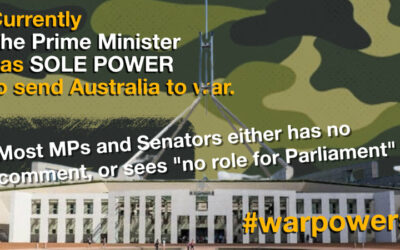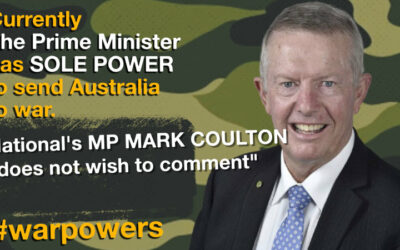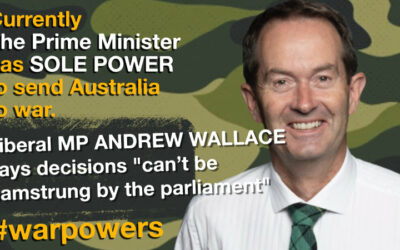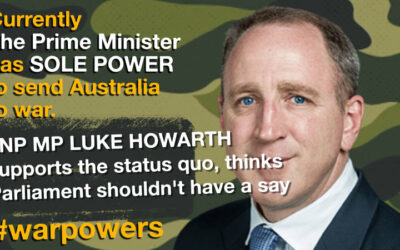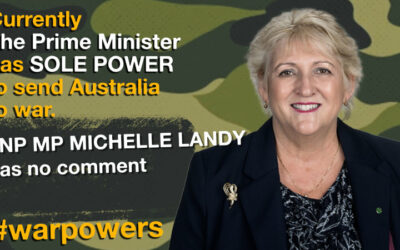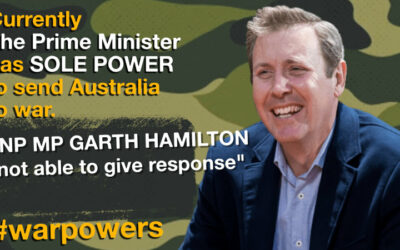The senate hearing on War Powers Reform starts today. Of the over 100 submissions made to the government’s “Inquiry into international armed conflict decision making”, the most compelling come from Australian veterans themselves. Zacharias Szumer reports.
As far as can be surmised from the submissions, those who have experienced the horrors of war generally support war powers reform. However, some veterans in parliament remain opponents of major changes to the status quo.
Two Vietnam War veterans have called for further democratisation of the way Australia goes to war, saying that the “poor decisions and dire unintended consequences” of Australia’s involvement in foreign wars have led to “many veterans suffering moral injury” and a wider “loss of faith in the integrity of Government”. In their submission to the inquiry, John Phillips and Noel Turnbull state:
Australia’s involvement in Vietnam, Iraq and Afghanistan was based on justifications which were expedient politically rather than militarily necessary” and in all three conflicts “the commitment, loss of life, ongoing costs and economic and social impacts far outweighed any perceived benefits.
“All commitments were the result of a Prime Minister alone making a decision – a captain’s call in effect – without proper reflection, debate or analysis of consequences,” say Phillips and Turnbull, who were both deployed to Vietnam. Turnbull was conscripted and served as an artillery officer and Phillips was a career infantry officer.
The two veterans said that “the direct and indirect impacts of moral injury on veterans are ultimately a significant cause of veterans’ mental health”, which had led to the “the enormous cost of treating and supporting veterans and their families”. This moral injury, Phillips and Turnbull write, had led to “profound feelings of guilt or shame —and in some cases a profound sense of betrayal and anger…” among some veterans.
They join other former servicemen and MPs Rex Patrick, Andrew Wilkie and Bob Katter in calling for reform to war powers, where one person decides to take Australians to war.
Phillips and Turnbull recommend that a parliamentary vote on military deployments should be required, with limited powers remaining “with the Prime Minister and the Executive only in national emergencies where there is a direct threat to Australia”. According to the two, there hasn’t been any direct threat to the nation in any of the wars we have been involved in since the Korean War in the early 1950s.
Other veterans have also made submissions to the inquiry supporting war powers reform. Richard Jones, who served 20 years in the Royal Australian Navy, writes:
Those sent to war, and their loved ones, should be able to do so in the knowledge that this action has the backing of the majority of the Parliament, and that there are clear political and diplomatic goals.
“If the Government of the day is unwilling or unable to make its case to the Parliament before committing Australian personnel to overseas conflicts, I believe this would demonstrate questionable morality and legality of the intended action,” he adds.
A submission made by Retired Major Cameron Leckie similarly argues that “Australia’s long-term best interests are best served by a legislative requirement for both houses of the Parliament to vote on the decision to commit to armed conflict overseas prior to any deployment of troops.”
“The current system,” Leckie writes:
….is fundamentally undemocratic and can lead to sub-optimal decision making that is not in the national interest with the potential for long-term negative (and potentially disastrous) consequences both for the country and for members of the ADF.
Leckie served in the Australian Army from 1995 to 2019 and was deployed on three operations, earning a Silver Commendation as the Executive Officer of the 1st Signal Regiment. He is also a member of the Executive Committee of Australians for War Powers Reform, and has previously spoken in favour of reform.
People who went to Iraq are still suffering the ill-effects of that and will probably continue to do so for the rest of their lives, so at the very least the parliament should be making those decisions,” said Leckie in a recent radio interview.
Other veterans support reform
Leckie’s name was among 158 other veterans who signed an open letter to the parliament on ANZAC Day this year, urging politicians to “change Australian law so that our armed forces cannot be sent to an overseas conflict without the approval of our parliament.”
The current arrangements have “not done justice to those who have served in the past and will not do so to those who may be called on to serve in future,” reads the letter.
That letter also had the backing of former Navy Admiral Chris Barrie, who served as Defence Force Chief between 1998 and 2002. Barrie recently reiterated his support on ABC radio, saying that he supports “the basic notion of having the parliament decide to send Australian troops to a war or conflict in other countries.”
Other veterans have previously spoken up in support of reform. In 2016, Lieutenant-General Peter Leahy, who finished a 37-year military career with six years as Chief of Army, wrote that:
it is time for a bill to be enacted requiring parliamentary approval before the ADF is deployed.
“We trust [parliament] with a whole range of important economic, health and social policy issues – why not the decision to go to war?” Leahy questioned in the Quarterly Essay.
Peter Hayes, a former RAAF group captain and Vietnam War veteran, is also an advocate for reform. “Resolving a decision to go to war against a foreign adversary is indeed a matter of national interest most worthy of the parliament’s undivided attention,” Hayes recently told MWM,
According to Hayes, who has also previously served as Director of Information Warfare at Australia’s Air Command Headquarters, executive control had “failed utterly” in sending Australian troops to Iraq. “History has also revealed serious defects in the decision to commit Australian forces to war in Vietnam, to Afghanistan, to Syria, not to mention other secret clandestine intelligence collection operations in the post-WW2 period,” he added.
Parliamentary veterans divided
Three other servicemen and current or former federal parliamentarians—Bob Katter, Rex Patrick and Andrew Wilkie—are also supportive of a greater role for the parliament. Wilkie, who served in the ADF for 21 years, has also made a submission to the inquiry, reiterating his support for war powers reform.
War Powers: four perspectives from politicians who have served
However, some veterans in the parliament are staunchly opposed to parliamentary war powers. They include Liberal party Senators Jim Molan, Linda Reynolds and David Fawcett, who are all members of the defence subcommittee handling the Inquiry into international armed conflict decision making.
Despite remaining an opponent of parliamentary war powers, Molan has made a submission to the inquiry in which he recommends the establishment of a new Joint Parliamentary Committee on Defence to provide “valuable parliamentary oversight of defence policies and decisions, such as the proposed deployment of Australian troops.”
Other MPs with military experience have so far have not provided MWM with any opinion on war powers reform. These include Liberal party MPs Phillip Thompson, Gavin Pearce, Keith Wolahan, Vince Connolly, Andrew Hastie, Stuart Robert; Liberal senator Andrew McLachlan; and Labor MP Luke Gosling are also both on the defence subcommittee.
They represent us in parliament, but MPs say declaring war is above their pay grade
Zacharias Szumer is a freelance writer from Melbourne. In addition to Michael West Media, he has written for The Monthly, Overland, Jacobin, The Quietus, The South China Morning Post and other outlets.
He was also responsible for our War Power Reforms series.




